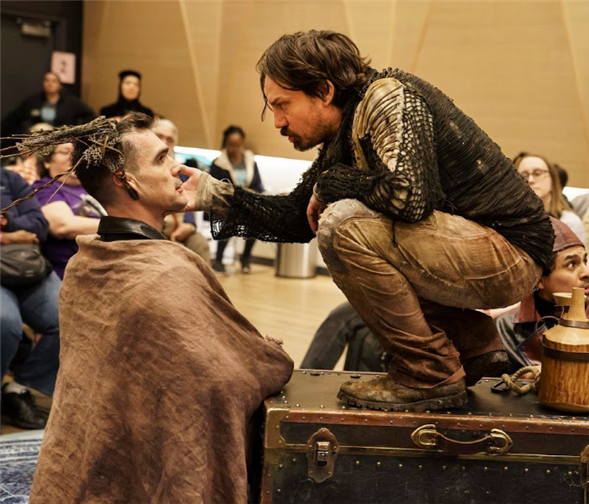Translate Page

Why Christopher Ryan Grant keeps coming back to The Public Theater's Mobile Unit
---
Yale School of Drama grad Christopher Ryan Grant has acted on Broadway and off, plus plenty of regional theatre. Yet many of his most memorable acting experiences didn't take place on a traditional stage. As a veteran of The Public Theater's Mobile Unit, Grant has performed Shakespeare plays in NYC prisons, homeless shelters, senior centers, schools gyms and community hubs for audiences that often have little prior exposure to theatre, let alone the Bard.
Grant is currently appearing in his fifth Mobile Unit production, as Caliban in The Tempest. This week, the show began its run at the Public after having completed a three-week, five-borough tour. Even though it's now in an actual theatre, it retains its scrappy, unpretentious feel. Streamlined to 90 minutes with a multicultural cast, spare design and lots of audience interaction, this Tempest, like all Mobile Unit shows, is designed to appeal to folks who aren't regular theatregoers. And since all the tickets are FREE, anyone can afford to go.
Grant was recruited to the Mobile Unit by Patricia McGregor, who directed Hamlet in 2016. The two knew each other from Yale, and when McGregor was in need of a drummer she called Grant, who's also a percussionist. He was actually already playing Polonius and the Gravedigger in a different mounting of Hamlet out of town, but when McGregor promised to throw in a monologue as the Player King, Grant signed on.
"Some of my experiences with Hamlet are what solidified why this is important for actors to do," Grant says. In fact, he believes every performer should do two things: wait tables and act in a Mobile Unit production. "In a lot of the places we go to, not only have the audiences never seen Shakespeare before, sometimes they've never even seen a play," he says. "As an actor, I've learned that the less precious you are the more successful you are." With no private dressing rooms or theatrical lighting or microphones or even a stage, preciousness goes out the window, and Grant believes that heightens the stakes. "These audiences react in a way that lets you know very quickly if you're a good storyteller or not," he says. "I've had people in the front row who have taken full phone calls and there's no hiding that!"
Rather than being disheartened by behavior that would be chastised on Broadway, Grant sees it as an opportunity to win over reluctant spectators. He remembers the first time he visited a women's shelter with Hamlet, where the cast was performing in the TV room. Initially, the residents "wanted to watch their stories, and all of a sudden here's the Huzzah! Shakespeare Players!" he recalls. "They were very vocal about us being there, but by the time Chukwudi Iwuji finished Hamlet's third act soliloquy, they were in, they were totally in. They were getting their friends and asking them to sit down and see this thing."
Since his inaugural Mobile Unit experience three years ago, Grant has played Sir Toby Belch in Twelfth Night, Nick Bottom in A Midsummer Night's Dream, Antigonus in The Winter's Tale and now Caliban, who's enslaved to Myra Lucretia Taylor's revenge-seeking sorcerer Prospero in The Tempest. Taylor, an actress of color, makes quite an impression in a part usually done by a man. "It's always interesting to see someone besides a befuddled old white guy play that role," Grant says, laughing.
A seasoned Shakespearean fool, Grant injects unexpected humor into his interpretation of Caliban, who is often played as more fearsome than funny. But the actor is a natural clown. "An overconfident buffoon? That's exactly me!" he says. "Undeserved confidence, just smashing my way through the world? That sounds perfect!" That approach works well for Mobile Unit productions, which tend to lean into the humor of the plays, even a tragicomedy like The Tempest.
While Grant acknowledges touring the Mobile Unit shows is exhausting, he misses the anything-can-happen vibe when the productions settle in at The Public. "I think everybody in a Broadway house or at the Public should be given tomatoes, so if you're not doing your job you get a tomato launched at you," he says. "That would change the temperature of the room pretty quickly!"
Although the theatre isn't handing out produce, The Public is working hard to make the downtown run accessible to anyone who wants to attend. At every performance, up to 30 seats are reserved for members of underserved communities. The rest of the FREE tickets are distributed via a digital lottery or in person 90 minutes before curtain.
And that leads to some very diverse audiences. "My favorite experiences are watching all the polite, golf-clapping people get taken for a ride when an audience that doesn't know how to 'behave' at the theatre shows up and brings the party to town," Grant says. "If people are talking during your show that's magic -- it means they're so involved they have to say something. Sure, that can get irritating if what they're talking about has nothing to do with what you're doing on stage. But to me, that's a sign that you need to be a better storyteller."
---
Jose Solís is a NY-based writer and editor who's been covering theatre and film professionally since 2003. He is a member of the Drama Desk. Follow him at @josesolismayen. Follow TDF at @TDFNYC.
Top image: Dan Domingues and Christopher Ryan Grant in The Public's Mobile Unit production of The Tempest. Photos by Joan Marcus.
TDF MEMBERS: Go here to browse our latest discounts for dance, theatre and concerts.